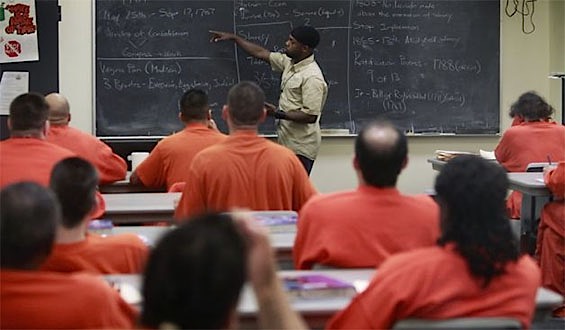
67 colleges and universities will participate in the new Second Chance Pell pilot program that expands access to financial aid for incarcerated individuals, the Department of Education announced last week
Eligible incarcerated Americans will be able to pursue post-secondary education with the goal of helping them get jobs to support their families when they are released, and reduce their recidivism rates.
RELATED: L.A. Sheriffs Offer Tattoo Removal to Inmates Who Want to Change Their Lives
RELATED: Tim Robbins Has Prison Drama Class That Cuts Recidivism in Half
“The evidence is clear. Promoting the education and job training for incarcerated individuals makes communities safer by reducing recidivism and saves taxpayer dollars by lowering the direct and collateral costs of incarceration,” said U.S. Secretary of Education John B. King Jr. “I applaud the institutions that have partnered to develop high-quality programs that will equip these students with knowledge and skills (to) promote successful reintegration and enable them become active and engaged citizens.”
Selected colleges and universities will partner with more than 100 federal and state penal institutions to enroll roughly 12,000 incarcerated students in college educational and training programs. Through the Second Chance Pell pilot program, these institutions may provide federal Pell Grants to qualified students who are incarcerated and are likely to be released within five years of enrolling in coursework.
WATCH: Give a Prisoner an Abused Dog and See What Happens—Karmic Connection
“Access to high quality education is vital to ensuring that justice-involved individuals have an opportunity to reclaim their lives and restore their futures,” said Attorney General Loretta Lynch.
The vast majority of the selected schools are will offer classroom-based instruction on-site at the corrections facilities. Others will offer online education, or a hybrid of classroom and online instruction. More than 10 percent of participating educational institutions are Minority-Serving Institutions and approximately 37 percent will offer prison-based education for the first time. Selected schools may begin offering education and training as early as July 1.
RELATED: Artists Spark Real Reform in Teens, Rally for Alternative to Prison in Virginia
Recognizing that incarcerated students require additional support, many of the selected sites provide robust academic, career, and social support services to facilitate post-secondary persistence and completion. In some cases, this includes remedial or supplementary instructional services to ensure the incarcerated students served will be able to benefit from the post-secondary education and/or training provided. Many partnerships also work with a variety of community-based organizations and non-profit organizations that support successful reentry. Finally, all of the sites will provide counseling or guidance to potential students to assist them in completing the FAFSA.
MORE: New Detroit Auto Factory Will Help Ex-Convicts Build New Beginnings
Last month, the Department of Education released the Beyond the Box Resource guide for colleges and universities that encourages alternatives to inquiring about criminal histories during college admissions and provides recommendations to support a holistic review of applicants.
(Photo via Equal Justice Initiative)



















